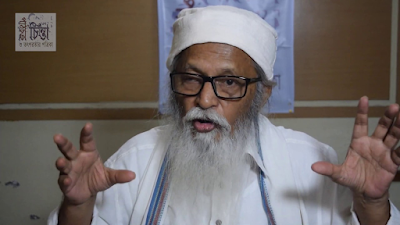Padma Bridge possibly received the highest media attention, as well as millions of citizens, mostly proletariat and working class were enthusiasts of the landmark communication in this century. Of course zeal of the leaders, members and sympathisers of the Awami League fervour was at a different height.
The bridge’s pre and post-inauguration obviously received media hype and the issue was a priority on the prime-time talk shows, special newspaper columns and of course the first-page stories and photo features.
In one such talkshow hosted by a New York-based exiled journalist, Kanak Sarwar, the show sought the feelings and reactions about Padma Bridge from an acclaimed poet, writer and philosopher Farhad Mazhar. Well, I heard the entire discussion and understand the discussion fairly well.
Farhad Mazhar is a trained pharmacist and played a crucial role in the establishment of Gonoshasthaya Pharmaceuticals Ltd. We often met him (Farhad) in Savar while researching with Nadira Majumder writing for Shaptahik Robbar on ‘drug imperialism’ which resulted in the announcement of a landmark drug policy in 1982.
Farhad has huge followers and fans for his outspoken philosophical debate on society, religion and politics. His poetry books are best-sellers in the Ekushey Book Fair.
He advocates Sufism and ‘Naya Krishi’ or the organic agriculture movement. His love and hate for the present regime are very well understood. In his recent interview with BBC Bangla radio, he could not defend many of his deeds, actions and statements in the last decade.
In the BBC Bangla video interview, he failed to satisfy the audience regarding his undaunted commitment to the Sunni Islamist group Hefazat-e-Islam Bangladesh (Defenders of Islam), a staunch advocate for Sharia Laws.
Among the hosts of tainted speakers (including leaders from BNP and other reactionary elements in the society), he also joined the bandwagon of Hefazat-e-Islam Bangladesh’s showdown in Motijheel in 2013. He was shown live on private TV Channels from Motijheel Shapla Square expressing his alliance with the Islamist movement.
The downtown Motijheel, a financial district in the capital Dhaka was blocked for two days. The Islamist and rightist elements had plans to cripple the financial activities and force the secular government of Sheikh Hasina to bow down.
The show of political strength ended in chaos and fiasco after riot police with armoured personal carriers(APC) and volleys of stun grenades in a pre-dawn operation literally scared the Mullahs.
Farhad defends the shut-down of the Dhaka metropolis by tens of thousands of Islamists and argues that the shadowy outfit is a “democratic” organisation.
His feminist wife Farida Akter, in an article in a popular Bangla daily, defended the misogynist Hefazat’s opposition to the women’s empowerment goals.
Many were shocked to read Farida’s illogical argument against the proposed Women’s Development Policy, 2011. She continues to oppose the policy singing to the tune of Islamists and says the policy is influenced by multinationals, corporates and a donor-driven women’s development policy.
Unfortunately, despite the nation having a woman-headed government, it has failed to implement the women’s policy for fear of Islamist antagonism.
Meanwhile, the learned Farhad Mazhar has told Kanak Sarwar’s audience that the newly build Padma Bridge was in fact the third bridge over the mighty river the Padma.
The first was Hardinge Railway Bridge (1912) and the second was Lalon Shah Road Bridge (May 2004) connecting Pakshey, Pabna and Bherapara, Kushtia, he said.
He lost in a myriad of hydrological data on the location and position of Padma River and mixed it up with the lower Ganges (Ganga in Bangla) river.
In fact, hydrological experts had determined that the Padma River is 120 km in length and begins from Goalondo to Chandpur. While the Ganges basin originates in north India from the Himalayan Mountains. It reaches the Farakka Barrage and continues on the bank of Chapai Nawabganj and flows through Hardinge Bridge and Lalon Shah Bridge.
The Ganges merged with the yawning Jamuna River at the confluence of Goalundo (once a vibrant railway and steamer ghat). From here Padma River begins its journey ending the flow of the Jamuna River.
Thus Padma Bridge is the first and until now the only longest road and rail communication bridge, beside Bangabandhu Bridge (also popularly known as Jamuna Bridge).
The all-knowing poet and philosopher have interpreted the river under Hardinge and Lalon Shah bridges as Padma River based on a myth.
The myth says that the Ganges River becomes the Padma River from Chapai Nawabganj bordering India and Bangladesh, which has been challenged by hydrological experts and river morphologists.
To continue with the debate, the massive irrigation project is Ganges-Kobadak Irrigation Project (or GK Project). The project is not a ‘Padma-Kobadak Project’. The largest surface irrigation system serves the southwestern region of Bangladesh – covering Kushtia, Chuadanga, Magura and Jhenaidah districts.
Similarly, the Ganges Barrage Project was proposed to hold back rainwater during the monsoon season because of the periodic drying up of the Ganges River in Bangladesh due to the withdrawal of the flow at Farakka Barrage. However, the Ganges Barrage Project was formally cancelled in 2017.
Hope these few pieces of information will enlighten Farhad Mazhar’s knowledge of the location and geo-position of the Padma River and also adopt the scientific knowledge of hydrologists and river morphologists and shun the myths from his mind and heart.
First published in The News Times, Dhaka, 5 July 2022
Saleem Samad, is an independent journalist, media rights defender, recipient of Ashoka Fellowship and Hellman-Hammett Award. He could be reached at <saleemsamad@hotmail.com>; Twitter @saleemsamad


